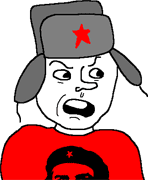|
Going by strict "abolish private property" definitions, there must still be socialists who are committed democrats. I don't personally agree with their solutions, but they're legit.
|
|
|
|

|
| # ? Jun 7, 2024 05:03 |
|
Fojar38 posted:This is not a new argument, and when people say "democracy" nowadays they are generally referring to a system of representative democracy with separation of powers and an independent judiciary. Nobody (well, no sane person) in 2019 is arguing for direct democracy where you elect a King and that's it. It's a dumb argument because you don't need a dictator at all to take away people's right to vote and live free in your country or to commit genocide on those people or people in other countries. AlexanderCA posted:Going by strict "abolish private property" definitions, there must still be socialists who are committed democrats. I don't personally agree with their solutions, but they're legit. Most socialists want democracy but also think democracy under capitalism is a sham because informed consent doesn't exist in a society where capitalism controls the media.
|
|
|
|
Ogmius815 posted:One can speculate about why. I suspect itís because what people actually want often turns out not to be socialism. BrokenGameboy posted:Now this is an interesting take. What does it really mean to be a "true democracy"? Do you mean a pure direct democracy, where all policy decisions are directly voted on by the public? Ogmius815 posted:Lots of people who call themselves “socialists” are actually liberals. Like, for example, the socialist parties in Spain and France. Or, for that matter, Bernie Sanders. The “socialists” I’m referring to are only those such as appear in this thread who are explicitly anti-liberal. AlexanderCA posted:Going by strict "abolish private property" definitions, there must still be socialists who are committed democrats. I don't personally agree with their solutions, but they're legit. Bob le Moche fucked around with this message at 06:04 on Nov 13, 2019 |
|
|
|
Bob le Moche posted:It's about power. Where does power lie in society? In a ruling class minority who own everything and has disproportionate power over everybody else? Or equally distributed among the people? Wouldn't that exclude Chinese democracy as well as western democracy?
|
|
|
|
BrokenGameboy posted:Wouldn't that exclude Chinese democracy as well as western democracy? I can't really tell from your question though whether you mean that China has a capitalist ruling class of property owners, or a ruling class of communist party bureaucrats, or what.
|
|
|
|
Bob le Moche posted:Yeah man this is why under capitalism there's never any need to enforce private property through the threat of violence, because everyone just agrees that having a tiny minority own everything in the world while everybody else works for them to receive the bare necessities is totally great. Itís just a non-sequitur to say that any enforcement of private property is indicative of a broad popular consensus against private property. By this logic, any state action is evidence that the popular will goes the other way. Thus, all of Chinaís numerous crackdowns on any real opposition to the CCP indicate that the CCP does not enjoy popular support, since otherwise there would be no need to enforce its political monopoly through the use of force.
|
|
|
|
the current system in hong kong vests almost 50% of parliamentary power in Literally Corporations and anyone who thinks that is fine needs to tear up their leftist card immediately
|
|
|
|
Ogmius815 posted:Itís just a non-sequitur to say that any enforcement of private property is indicative of a broad popular consensus against private property. "James Madison" posted:In England, at this day, if elections were open to all classes of people, the property of the landed proprietors would be insecure. An agrarian law would soon take place. If these observations be just, our government ought to secure the permanent interests of the country against innovation. Landholders ought to have a share in the government, to support these invaluable interests and to balance and check the other. They ought to be so constituted as to protect the minority of the opulent against the majority. GreyjoyBastard posted:the current system in hong kong vests almost 50% of parliamentary power in Literally Corporations and anyone who thinks that is fine needs to tear up their leftist card immediately
|
|
|
|
Bob le Moche posted:I never said anything about the Chinese system? (which, it's worth repeating, is not the system they have in Hong Kong.) I meant both. Since wouldn't both be a minority with a disproportionate power ruling over a majority?
|
|
|
|
Bob le Moche posted:Um yes, to leave no ambiguity here, Hong Kong is one of the most capitalist cities on earth and I have expressed this before in this thread. I think the idea is that this is unlikely to change significantly under CCP leadership and is, in fact, a situation preferable to the CCP elite, who themselves are capitalists in all but name and have enriched themselves considerably at the expense of the working class by encouraging the growth of capitalism in their country. By expressing support for them, youíre not supporting socialism over capitalism, rather youíre expressing support for rightwing authoritarian capitalism over centrist liberal capitalism.
|
|
|
|
Heithinn Grasida posted:I think the idea is that this is unlikely to change significantly under CCP leadership and is, in fact, a situation preferable to the CCP elite, who themselves are capitalists in all but name and have enriched themselves considerably at the expense of the working class by encouraging the growth of capitalism in their country. By expressing support for them, you’re not supporting socialism over capitalism, rather you’re expressing support for rightwing authoritarian capitalism over centrist liberal capitalism. main thing is, the centrist liberal capitalism which you think is great for everyone could not have developed in HK, singapore and so on without the exploitation of china for the cheap labor, which allowed those states to "upgrade" by outsourcing their simpler industries and production processes, which was highly profitable, and then taking that extracted value and reinvesting it into service-based economies, which they monopolized. these upgraded industries range from design, marketing, research, high tech, complex logistics and procurement operations and supply chain management, among other things. the dirty sweatshop stuff gets dumped into third world countries. hong kong also developed to be on par with the rest of the richest countries because it acted as a great sluice gate for foreign direct investment into china for these outsourcing ops, and the elites in china (as you point out) willingly allowed chinese workers to be exploited in such a way. but what other option did they have? china still has a gun to its head, but it could better set the terms and conditions because it has a strong state institution -- a communist party -- of the kind that much of the third world lacks (see the democratic republic of the congo) more to the point, how could adopting the same model in china (population: 1.4 billion) possibly work? where do they outsource? hence why china is facing a "middle income trap" (although that's more like a "low income trap" for the most developed poor countries). anyways, to focus on the conflict between rich, developed countries and what are still pretty exploited poor countries as like two "rival" systems -- while the poor ones are constantly under attack by a variety of methods to keep them poor -- ignores an overarching reality of a starkly divided world
|
|
|
|
Isn't the belt and road initiative in part an attempt to outsource to places like Africa, or am I confused?
|
|
|
|
BrokenGameboy posted:Isn't the belt and road initiative in part an attempt to outsource to places like Africa, or am I confused? Increase mineral transit speed is imperative to chinese goals in the region.
|
|
|
|
BrutalistMcDonalds posted:the per capita income in china is about now -- after decades of rapid development -- roughly on par with mexico, the dominican republic and thailand. the polarization in the world is still pretty stark, and has in fact become wider even though incomes in third world countries (like china) have gone up. at the same time, incomes in hong kong, singapore, south korea, taiwan have converged with that of the other developed countries, but these are not historical nations but pieces of larger nations broken off by anti-communist war or imperialist annexation and then given preferential development assistance and opportunities. of course this was all mystified in the western press as growth "miracles" and not a deliberate strategy to contain the soviet union and china. together, hong kong, singapore, south korea and taiwan come to around 1% of the world population. I agree with this assessment of the situation and at no point did I say that centrist liberal capitalism is good for everyone. In fact, I donít think itís much good for anyone, even the wealthiest members of the capitalist class, since it seems to inevitably be leading to horrible irreversible damage to the entire world through climate change that will be catastrophic even for the richest of the rich. My personal opinion is that itís probably preferable to rightwing authoritarianism, which basically seems equally greedy and short-sighted, but I also have to recognize that I personally, as a white person who was born in the US, am one of the biggest beneficiaries of the system. But I think itís awfully hypocritical to be on the side of countries like Russia or China in the name of socialism. Yes, itís clear rich countries will never allow poor countries to become rich as long as they can prevent it and I donít think following Washington or attempting to imitate Western liberal democracy is necessarily the answer for China or other developing countries. I do believe democracy, even the terribly flawed form in the US, is a better form of government in the long run, but China may well not have the institutions to maintain it yet, particularly when under constant threat of sabotage from the west. I donít know what the right answer for China is and I think it would be presumptuous of me to assume I do. But that doesnít mean the current government stands on the side of the working class or are not rightwing authoritarians in the process of committing genocide.
|
|
|
|
The USís lack of democracy has also put right-wing authoritarians in power there.
|
|
|
|
But hopefully they can still be kicked out, instead of once getting power, being able to eliminate term limits so they can stay in power forever.
|
|
|
|
Heithinn Grasida posted:But hopefully they can still be kicked out, instead of once getting power, being able to eliminate term limits so they can stay in power forever. The millitary juntas are easier to kick out than people who are "falsely" getting elected. That sure is a take
|
|
|
|
Varinn posted:The millitary juntas are easier to kick out than people who are "falsely" getting elected. What? I mean hopefully Trump can still be kicked out and wonít be able to remove the term limit on the office of President. The government of China, if you recall, removed the term limit on the office of president not too long ago.
|
|
|
|
Heithinn Grasida posted:I agree with this assessment of the situation and at no point did I say that centrist liberal capitalism is good for everyone. In fact, I don’t think it’s much good for anyone, even the wealthiest members of the capitalist class, since it seems to inevitably be leading to horrible irreversible damage to the entire world through climate change that will be catastrophic even for the richest of the rich. My personal opinion is that it’s probably preferable to rightwing authoritarianism, which basically seems equally greedy and short-sighted, but I also have to recognize that I personally, as a white person who was born in the US, am one of the biggest beneficiaries of the system. BrutalistMcDonalds fucked around with this message at 09:06 on Nov 13, 2019 |
|
|
|
Well that sounds rather hopeless. You really don't think there's a possibility for class mobilization in the developed world?
|
|
|
|
dunno. there might be, but the prospects of uniting with chinese workers in a shared struggle seems pretty unlikely. this isn't to say xi jinping is good and true socialist hero but that recognizing that china is exploited is the first step toward building any kind of relationship across national boundaries. the hong kong protesters do not, as a general rule, seem interested in my suggestion but maybe i'm wrong
|
|
|
|
I kinda meant in the developed world in general. I'm not sure how Hong Kong will go. There's so much going on in general there, and no side in the issue currently seem to be inherently good.
|
|
|
|
BrutalistMcDonalds posted:the per capita income in china is about now -- after decades of rapid development -- roughly on par with mexico, the dominican republic and thailand. the polarization in the world is still pretty stark, and has in fact become wider even though incomes in third world countries (like china) have gone up. at the same time, incomes in hong kong, singapore, south korea, taiwan have converged with that of the other developed countries, but these are not historical nations but pieces of larger nations broken off by anti-communist war or imperialist annexation and then given preferential development assistance and opportunities. of course this was all mystified in the western press as growth "miracles" and not a deliberate strategy to contain the soviet union and china. together, hong kong, singapore, south korea and taiwan come to around 1% of the world population. China only achieved its economic success after Deng Xiopeng's economic reforms. I am not here to celebrate capitalism but I wish you would realise maybe the other side sucked more. BrutalistMcDonalds posted:but one way that it won is by essentially bribing enough of their own people to get them to buy into the system. mass home ownership in the U.S. as a means of shoring up domestic stability is one example because debt encumbered homeowners don't strike.
|
|
|
|
They said the "historical nations" thing again. It's as wrong as it was last time.
|
|
|
|
Budzilla posted:What about Japan? It is just about trade access to Western especially US markets, Japan was ahead of the curve because of the aftermath of the war. More or less the same thing about Deng. That said, the entire economic history of China is usually glossed over, like the fact that China had traditional Stalinist style industrialization (and very high growth) to the Sino-Soviet split. The Great Leap Forward if anything was born out of complete desperation. (Actually Soviet and Chinese history largely parallel each other to a point.) Ardennes fucked around with this message at 13:25 on Nov 13, 2019 |
|
|
|
Bob le Moche posted:Don't take it from me, here's what the "father of the US constitution" had to say on the topic in 1787: Wait, when did Hong Kong become a city?
|
|
|
|
Ardennes posted:It is just about trade access to Western especially US markets, Japan was ahead of the curve because of the aftermath of the war. Don't know enough to say how important this was but I guess another factor you could emphasize is how Japan received alot of post-war aid in order to build it up as a strong anti-communist bulwark in Asia, which puts Japan in a very different position from say alot of countries in Latin America in which you had aid given to anti-communist forces partly in order to enable continued Western resource exploitation and trade advantage. Also in Japan the US occupation administration carried out alot of reforms that seem a bit strange in light of how the US operated later in the Cold War and in other parts of the world. This included extensive land-reform (of what was still a country with an extensive peasant economy) which effectively ended landlordism and led to about 90% of agricultural land in Japan being self-owned and operated, they also promoted and supported establishment of and membership in labor unions, which also was largely successful helping to make organized labor a pretty strong political force in post-war Japan, and combated and dismantled the Zaibatsu industrial cartels which had dominated the economy (though they would later re-emerge in a somewhat different form as the Keiretsu).
|
|
|
|
I don't know enough about post-war Japanese economic history and I need to read the Chalmers Johnson book on MITI. But I wonder if the U.S. willingness to order those reforms came about as the U.S. was still trying to present as a progressive "third way" between the communist east and (old) Western colonial powers. Like the U.S. veto during the Suez Crisis and playing footsie with Nasser who the British absolutely hated. But that went out the window with the JFK assassination and LBJ coming into power. I think the Vietnam War is when the U.S. shifted over into just being an empire.
|
|
|
|
Budzilla posted:What about Japan? Literally whataboutism. Keep in mind China was under a siege state until Kissinger came and opened a second front against the USSR by allying with China. Additionally, the groundwork for economic success was probably laid by the massive amounts of infrastructure and heavy industry as a result of the GLF, coupled with the huge increases in peasant education and health from the GPCR. BrokenGameboy posted:Well that sounds rather hopeless. You really don't think there's a possibility for class mobilization in the developed world? Marx didn't account for capitalist agency and did not realize the richest countries in the world can probably stave off socialism forever as long as the bleeding heart capitalists share enough of the loot with the people to keep them happy. Traditional marxist analysis doesn't have much to say about the 32% of Americans who have 401ks or pensions that can make the jr. bourgeoisies.
|
|
|
|
CAPS LOCK BROKEN posted:Keep in mind China was under a siege state until Kissinger came and opened a second front against the USSR by allying with China. Seems like this is the single greatest point of failure for twentieth century communism as an ideological and political force, to me. Anyway BrutalistMcDonalds thatís some good analysis and I appreciated reading it, thank you.
|
|
|
|
Lightning Knight posted:Seems like this is the single greatest point of failure for twentieth century communism as an ideological and political force, to me. A big issue was Krushchev himself, the secret speech, and the fact the Soviet Union did act in a high-handed manner versus Mao (far more could have been done to repair the relationship before it was too late). Of course, there is also the arguement that even if the Sino-Soviet split hadn't happened a Eurasian bloc still would have struggled versus the West which was still vastly stronger. If anything, ironically, an alliance with the US needed to happened in order for the type of rapid industrialization to occur of a long period of time order to challenge the US directly. Also, I don't know if even a Sino-Soviet alliance could have survived the oil crash of the 1980s but that is just speculation. Btw, most of the rapid industrialization that occured in China was before the Great Leap Forward itself, and utilized a more traditional Stalinist-Gosplan model. The entire point of the Great Leap Forward was that China had almost no trade partners or access to technology and had to desperately try to bootstrap development. The Cultural Revolution (in a parallel to the Great Purge) was largely the result of the general failure of the Great Leap Forward (and the Second Five Year Plan) of a variety of reasons....much of which had far more to do with trade access than "communism." Another issue in both cases both states had to split industrial development with a military build-up that sapped resources and both states had general issues with collectivization. Btw, one of the key issues with collectivization itself isn't the fact that fields were combined or communal living or even dekukalization...but pricing. Usually, the state demanded (or arguably needed to demand) rock bottom prices from collective farms which often greatly decreased supply/productivity. The state usually needed to do this because the government needed cheap grain for urban centers/export, this was especially crucial when both the Soviet Union/PRC were intertionally isolated during the 2nd FYP/GLP. In contrast, Japan had trade access with Western markets within months of signing its surrender, and the US opened up trade with Korea/Taiwan later on during the Cold War. More or less, a similar situtation existed in Western Europe, although Finland/Yugoslavia were special cases (Finland being a liberal-capitalist state that made a geninue attempt at keeping positive trade-political relationship with the Soviets and the Yugoslavia being the reverse.) Also, India during the Cold War actually had a pretty warm relationship with the Soviets, and difficult getting Western trade access to the 1990s. TLDR: to understand 20th century history, you need to understand how trade functioned Ardennes fucked around with this message at 15:12 on Nov 13, 2019 |
|
|
|
BrutalistMcDonalds posted:I don't know enough about post-war Japanese economic history and I need to read the Chalmers Johnson book on MITI. But I wonder if the U.S. willingness to order those reforms came about as the U.S. was still trying to present as a progressive "third way" between the communist east and (old) Western colonial powers. Like the U.S. veto during the Suez Crisis and playing footsie with Nasser who the British absolutely hated. But that went out the window with the JFK assassination and LBJ coming into power. I think the Vietnam War is when the U.S. shifted over into just being an empire. Without a resurgent Europe to counterbalance the US was free to go whole hog on the empire game.
|
|
|
|
BrokenGameboy posted:I meant both. Since wouldn't both be a minority with a disproportionate power ruling over a majority? Everyone agrees that China has a capitalist class, that there's inequality, etc. What some people disagree on is whether the Chinese state constitutes the dictatorship of that bourgeoisie in the way that it does in the West. I'll say that I agree with BrutalistMcDonalds's analysis of how China came to be what it is and have the relationship it has to HK today, and of the role of the Chinese Communist Party in that. Heithinn Grasida posted:But I think itís awfully hypocritical to be on the side of countries like Russia or China in the name of socialism.
|
|
|
|
I'm cross-posting a version of this from the other thread.  After getting a physical copy, I suspect that the Chinese-language text for "America against America", a book written by Wang Huning, is publicly available. At the time this was published, Wang Huning was a professor at Fudan University, but now he's a member of the standing committee of the Politburo of the CCP, and head of the Central Policy Research Office, which covers ideological matters for the party. There was some interest in the other thread for a long-term read/translation of this book's contents. This would be a long-term project, as the book has over 200,000 characters in it. From leafing through it, the book draws from Wang's travels in the US in 1988-1989, and his experiences in the Midwest (Iowa), the big cities, and his observations of the nasty 1988 presidential campaign. It could be a useful perspective for how a skeptical party man viewed the United States, but also potentially a look into a formative experience for a top CCP figure and one that has played a substantial role in formulating its ideological campaigns. As far as I can tell, this book has never been translated into English, and I've only seen some written papers make vague references to its contents. Is there enough interest for a long-term readthrough/discussion?
|
|
|
|
China is obviously much closer to fascism than any socialism ideal, given God Emperor Xi and his billionaire lackies, and Western capitalism and imperialism are also closer to corporate dystopia than a liberal dream. Everything is bad, and if you think you don't get killed if you get into the way of a) Western billionaires or b) Chinese billionaires, you are a big ol dumbo. hope that clears this up
|
|
|
|
Kangxi posted:I'm cross-posting a version of this from the other thread. I'm interested!
|
|
|
|
I have read/listen to about half way/ch 15 so far, I think early travel blog chapters you can just do an abridged once over, and the chapters about the political belief and constitution you can do a more thorough translation/read along. He mentioned Alexis Tocqueville alot. (USER WAS PUT ON PROBATION FOR THIS POST)
|
|
|
|
Kangxi posted:I'm cross-posting a version of this from the other thread. I'd read a Let's Read of it.
|
|
|
|
a chinese state approved ideological/condition assessment of the United States, drawing upon firsthand travels during the Bush/Dukakis election (and all of the other nuttiness of America in the late 80's anyway) by a principally important member and strategist of Xi's Politburo Standing Committee is gonna be some fascinating stuff
|
|
|
|

|
| # ? Jun 7, 2024 05:03 |
|
yep!
|
|
|





























